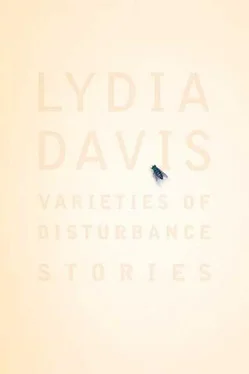Since they had both been married for many years, strolling together like this had some of the comfortable familiarity of long habit, yet it also had some of the awkwardness of a first date, since, after all, they did not really know each other very well. He was a small man, and delicate in his motions and gestures. She took care not to walk too close to him, and thought from his slight unsteadiness now and then that he was probably taking the same care to keep a certain distance from her.
When more than an hour had passed, they decided to return to their college. Now she volunteered to lead them by a different way, for the interest of it, along a street that ran parallel to the one they had come in on and would then connect to it near their destination. She did not explain all this to him, but simply assured him that the street they were about to enter would take them back to their college. He entrusted himself to her and paid little attention to where they were going, as he continued to talk.
He spoke emphatically, using strong adverbs, often expressing indignation, and admitting that some of his opinions were, as he put it, virally jaundiced: Certain things, according to him, were flagrantly obvious, or embarrassingly inaccurate, or patently ridiculous; others, of course, were magnificent, delightful, or entrancing. Condemning a certain publishing house, he remarked — although he was not old enough to have experienced the Second World War — that in its front line, incompetence and dishonesty pullulated like trench lice among infantrymen, and that the upper-level administrators should be taken out of the trenches every so often and given something restfully self-restoring to do, like sewing pages. She was content to listen, and several times thought how perfectly suitable was this conclusion — her own relative passivity, and the mild physical exertion — to the long, trying day.
Much of the street was familiar to her from passing it three times before, when the circular tour had headed out of town, but she became a little worried ten minutes into their walk back, when she was not sure which left turn to make. After all, things had flown by relatively quickly out the window of the bus. He questioned her mildly twice and she admitted her uncertainty the second time. But when they took what turned out to be the correct left turn and correctly rejoined their original road nearly opposite the restaurant where they had had dinner, and she was enjoying a feeling of satisfaction, he did not notice where they were, and simply walked on by her side, across the street from the restaurant, until she pointed it out to him. Then he was truly astonished, as though he had imagined they were far away from that corner and she had produced it out of her jacket pocket.
Now she thought he would recognize a parallel with a scene in the book she had translated, but he did not; she thought perhaps he was too occupied with reorienting himself. In the version he preferred, the passage read:
We would return by the Boulevard de la Gare, which contained the most attractive villas in the town. In each of their gardens the moonlight, copying the art of Hubert Robert, scattered its broken staircases of white marble, its fountains, its iron gates temptingly ajar. Its beams had swept away the telegraph office. All that was left of it was a column, half shattered but preserving the beauty of a ruin which endures for all time. I would by now be dragging my weary limbs and ready to drop with sleep; the balmy scent of the lime-trees seemed a reward that could be won only at the price of great fatigue and was not worth the effort. From gates far apart the watchdogs, awakened by our steps in the silence, would set up an antiphonal barking such as I still hear at times of an evening, and among which the Boulevard de la Gare (when the public gardens of Combray were constructed on its site) must have taken refuge, for wherever I may be, as soon as they begin their alternate challenge and response, I can see it again with its lime-trees, and its pavement glistening beneath the moon.
Suddenly my father would bring us to a standstill and ask my mother—“Where are we?” Exhausted by the walk but still proud of her husband, she would lovingly confess that she had not the least idea. He would shrug his shoulders and laugh. And then, as though he had produced it with his latchkey from his waistcoat pocket, he would point out to us, where it stood before our eyes, the back-gate of our own garden, which had come, hand-in-hand with the familiar corner of the Rue du Saint-Esprit, to greet us at the end of our wanderings over paths unknown.
Since he had not noticed, she intended to mention it soon, but was at the moment more interested in pointing out to him a house they were about to pass. It had once been the home of Charles Murray, the great editor of The Oxford English Dictionary.
When she had arrived in this town the day before, her strongest desire had been to see, not the more famous sights, but the house in which this editor had lived while doing the better part of his work, a personal account of which she had read by his granddaughter. She had taken pains to ask each person she met if he or she knew where this house might be. No one had been able to tell her, and as she ran out of time, she had given up the idea of finding it. Then, at the end of her day of touring, just as the tour bus had reached her street for the third time and stopped to let her off by the porter’s lodge of the college, the guide had said something about this same editor and his house. She was already climbing down the steps and half off the bus when she heard it, and could not question the guide further. She could not believe the house was right here, in this neighborhood where she was staying, and the next day she continued to ask each person she met where the house might be.
After she had given her talk at the conference, she was approached by a short, stout man with a preoccupied, almost angry expression who concentrated his attention on her alone, ignoring everyone around them, and asked several pertinent questions and made several concise remarks about her talk. He was modest enough not to identify himself, and when she asked him who he was, he said he had just retired as librarian of this college and would be pleased, in fact, to give her a tour of the library. Since he seemed to be a highly competent person with many facts at his disposal, she thought to ask him the question she had been asking everyone else since the day before. The librarian said that of course he knew the house — it was right across the street. And he immediately led her out to the corner and pointed. There it was, its upper story and roof showing above its brick wall, as though the librarian had taken it from his jacket pocket and set it there just to please her.
The situation was not exactly the same, of course, since the librarian had not magically brought her home but had instead produced the very house she had been looking for. But now she told the story to the critic, with whom she felt a closer companionship after walking so far with him and bringing him safely back. She thought that now he would recognize the situation, and think of their walk and the passage from the book he knew so well.
In her version, the scene read:
We would return by way of the station boulevard, which was lined by the most pleasant houses in the parish. In each garden the moonlight, like Hubert Robert, scattered its broken staircases of white marble, its fountains, its half-open gates. Its light had destroyed the Telegraph Office. All that remained was a column, half shattered but preserving the beauty of an immortal ruin. I would be dragging my feet, I would be ready to drop with sleep, the fragrance of the lindens that perfumed the air seemed a reward that could be won only at the cost of the greatest fatigue and was not worth the trouble. From gates far apart, dogs awakened by our solitary steps would send forth alternating volleys of barks such as I still hear at times in the evening and among which the station boulevard (when the public garden of Combray was created on its site) must have come to take refuge, for, wherever I find myself, as soon as they begin resounding and replying, I see it again, with its lindens and its pavement lit by the moon.
Читать дальше












